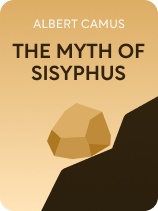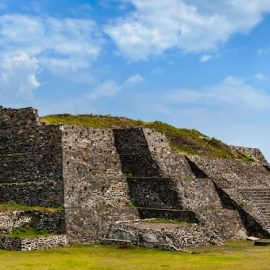

This article is an excerpt from the Shortform book guide to "The Myth of Sisyphus" by Albert Camus. Shortform has the world's best summaries and analyses of books you should be reading.
Like this article? Sign up for a free trial here.
What does Albert Camus regard as the limits of his knowledge? What does he believe is “the most urgent of questions”?
In his 1942 essay The Myth of Sisyphus, philosopher Albert Camus describes his theory of the absurd. Both a feeling and a condition of existence, the absurd describes the irreparable tension between the human desire for meaning and purpose in life—and the inevitability of oblivion and death.
Continue reading for The Myth of Sisyphus quotes that will have you thinking like a philosopher.
The Myth of Sisyphus Quotes
The Myth of Sisyphus is built on the philosophical theories of existentialism, metaphysics, and phenomenology. In the essay, Camus presents Sisyphus—a Greek mythological figure who was condemned to spend eternity rolling a boulder up a hill—as the quintessential symbol of life’s absurdity.
We’ve collected several The Myth of Sisyphus quotes and provided them along with some context and explanation to help you understand where Camus is going.
“I’m filled with a desire for clarity and meaning within a world and condition that offers neither.”
Camus begins his argument with the claim that both the universe and death are unknowable. Theories of existence—such as the belief that God provides life and an afterlife, that there’s a cosmic purpose to human existence which we may realize through our actions, or that death is the end of consciousness and life has no inherent meaning—are just theories, unprovable within the limits of human experience. Despite this, Camus argues that humans have an innate need to believe that our lives have purpose and that there’s continued existence after death, to the point that our inability to definitively answer these questions torments us. This contradiction between our needs and our reality is what Camus calls the absurd.
“This heart within me I can feel, and I judge that it exists. This world I can touch, and I likewise judge that it exists. There ends all my knowledge, and the rest is construction.”
Camus begins his argument with the claim that both the universe and death are unknowable. Theories of existence—such as the belief that God provides life and an afterlife, that there’s a cosmic purpose to human existence which we may realize through our actions, or that death is the end of consciousness and life has no inherent meaning—are just theories, unprovable within the limits of human experience.
“I see many people die because they judge that life is not worth living. I see others paradoxically getting killed for the ideas or illusions that give them a reason for living (what is called a reason for living is also an excellent reason for dying). I therefore conclude that the meaning of life is the most urgent of questions.”
Though Camus dismisses attempts to define the meaning of life, particularly religious ones, he also believes that life is the only thing that matters, as it’s the means by which you experience consciousness, pleasure, and growth.
“Although ‘The Myth of Sisyphus’ poses mortal problems, it sums itself up for me as a lucid invitation to live and to create, in the very midst of the desert.”
Camus describes the Greek mythological figure of Sisyphus as the perfect example of an absurd figure; for crimes he committed in life, the gods condemned Sisyphus to spend eternity in the underworld pushing a massive boulder up a hill, only for it to roll down again as soon as he reached the top. His commitment to this futile task, repeated over and over, represents everyday life, as people strive for meaning or for an escape from death that they can never achieve. Sisyphus himself represents the drive to live since he was known for his defiance of death.
Though Sisyphus is generally invoked as an example of divine punishment or torture, Camus believes that Sisyphus is happy despite his fate. He’s alive—in the sense that he still has a consciousness, even though he no longer has access to the world of the living—and he has a task to commit himself to, even if that task can never be completed. He continues to experience the world and to draw pleasure and strength from it. Camus argues that, like Sisyphus, a person committed to the absurd must dedicate themselves to being fully present for every second of life. Life’s value doesn’t come from the promise of eternity, or from any external source, but is self-evident.
“They deify what crushes them and find reason to hope in what impoverishes them.”
When giving examples of thinkers who recognized the absurd only to run from it, Camus points to two existentialists he admires, novelist Fyodor Dostoyevsky and philosopher Søren Kierkegaard. Both men ultimately turned to Christianity to satisfy their need for meaning and emotional catharsis, and Camus argues that, in doing so, they compromised their rationality.

———End of Preview———
Like what you just read? Read the rest of the world's best book summary and analysis of Albert Camus's "The Myth of Sisyphus" at Shortform.
Here's what you'll find in our full The Myth of Sisyphus summary:
- A breakdown of Albert Camus’s theory of the absurd
- Why humans should try to derive as much fulfillment from life as possible
- That there is no greater meaning to life, which is why life is so meaningful






